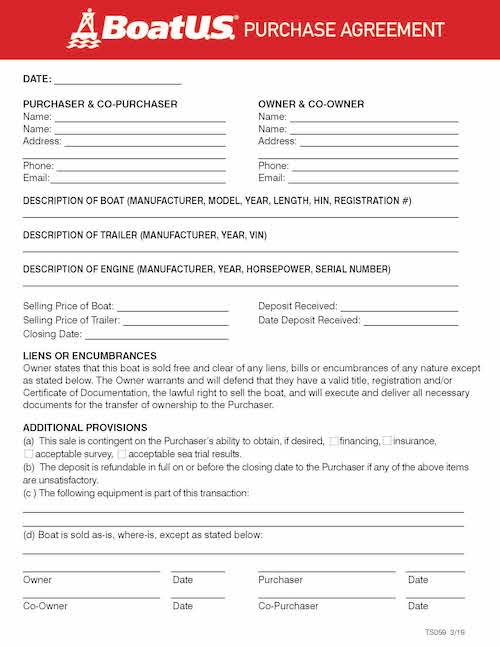

A boat bill of sale (also called a boat purchase agreement) is a document used to detail the terms of a transaction between a private seller and buyer. It’s a contract specific to a boat sale, and can be used for a powered or unpowered boat as long as it is not also a U.S. Coast Guard documented vessel registered by the U.S. government rather than titled and numbered by a state (there are separate forms for selling a documented vessel).

In some states, a boat bill of sale may not be required to complete the sale, but using one is a good idea as it provides proof of the details of the transaction. If the boat has a title—generally required in most states for boats more than 16 feet in length—that title will still need to be transferred from the seller to the buyer per state regulations.
You can make up your own boat purchase agreement or use a form that may be provided by your state (try searching online for “Michigan boat purchase agreement” for example). If you find a form, details for your state will likely be included. Some states require the boat purchase agreement to be notarized by both buyer and seller.
If your state does not require the use of a specific form, or does not offer one, you may be able to use a generic boat purchase agreement such as one offered by:
A boat bill of sale should include:
The HIN should be permanently marked on the boat transom to port. If the boat is powered by an outboard motor, it should be listed separately with its serial number.
If a trailer is being sold with the boat, it is also listed separately with its Vehicle Identification Number (VIN). The agreement should list a separate sale price for the boat, outboard motor and trailer. The agreement should also list any accessories or equipment being sold with the boat, such as electronics, trolling motor, spare props, with serial numbers if available. If you are selling the boat, items that are not included in the sale can be listed as “excluded” on the purchase agreement.
The boat purchase agreement can be executed before the sale is final, usually with a deposit, with contingencies, which could include securing financing or that the boat passes a mechanical inspection, marine survey, or sea trial. If issues crop up, such as a repair that should be made, those terms can be negotiated and spelled out in a new agreement, or the buyer can walk away with a refunded deposit.
Using a formal boat purchase agreement protects both the buyer and seller and goes a long way toward avoiding misunderstanding between the parties.
You May Also Like: